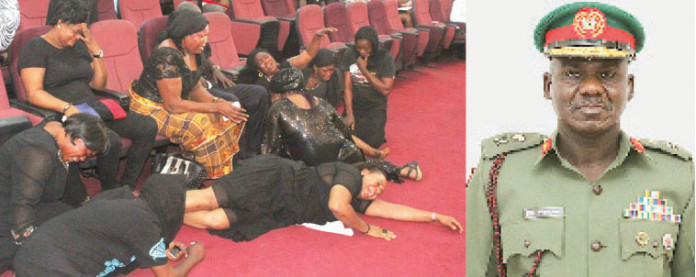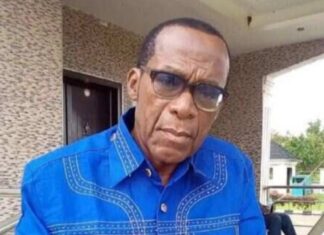Alleged military invasion of Ogoniland in Rivers State relives memories of 1993 disturbances in the community, Assistant Editor (South South), JOE EZUMA, reports.
Developments from the House Of Representatives Committee investigations into the army invasion of Ogoniland from January resulting to the March 19, 2016 mayhem will amount to a huge indictment on the Nigerian army as an institution, if upheld by the lawmakers.
They will also have serious implications on unity in Ogoniland, aside endangering the people’s agitation for safe environmental and economic wellbeing. Of grave concern is the likely impact of the development on the implementation of the United Nations Environmental Programme (UNEP) Report in the community. This is as the situation in Ogoni has reduced the importance of the Movement for the Survival of Ogoni People (MOSOP) as the mouthpiece of the area.
The sight of women wailing and rolling on the floor of the venue of the committee’s sitting, in the Rivers House of Assembly, on Monday, April 18, 2016, as victims testified against the invasion, brought to mind the ugly developments of the 1994 war in the community that led to the killing of prominent indigenes of Ogoni. The first set, comprising four prominent indigenes, were killed and set ablaze in 1994, while the other nine, accused of complicity in the act, were eventually executed on November 10, 1995 by the then military government under General Sani Abacha.
What have again brought the army into the affairs of Ogoni are developments from the March 19, 2016 re-run in the state. The contest, according to critics, also witnessed the awful involvement of soldiers into electoral politics rather than their usual watchdog role in Ogoni and some other parts of the state.
Back to history
In 1993, Kenule Saro-Wiwa spearheaded protests with about 400,000 Ogoni through four urban centres in the community, drawing international attention to the people’s plight. This did not go down well with the Anglo-Dutch oil multinational, Shell Petroleum Development Company (SPDC) as it viewed that engagement as an affront and a threat to its ventures in the Ogoniland.
That protest march, according to Dr. Godwin Ojo, Executive Director, Environmental Rights Action (ERA), “was deliberately misrepresented by Shell and served as the pretext for the occupation of the region by the Nigerian Army. On November 10, 1995, the General Abacha junta, instigated by Shell, sentenced Saro-Wiwa and eight other Ogoni leaders to death on charges that are, till date, not substantiated”.
Other Ogoni leaders who, with Saro-Wiwa, constituted the ‘Ogoni 9’ and who were hanged after being accused of being responsible for the killing of four Ogoni leaders who had come to be known as ‘Ogoni 4’, included Saturday Dobee, Nordu Eawo, Daniel Gbooko, Paul Levera, Felix Nuate, Baribor Bera, Barinem Kiobel and John Kpuine.
On the other hand, the Ogoni 4, who had earlier been murdered allegedly at the instance of Saro-Wiwa and his group, were Chief Edward Kobani, a former Rivers State Commissioner; Chief Albert Badey, former Secretary to the Rivers State Government. The other two were the Orage brothers, Chiefs Simon and Theophilus Orage.
What particularly aroused widespread international condemnation and anger on the murder of the Ogoni 9 was that the Nigerian government had earlier given assurance that they would not be hanged.
In demonstration of the angst by the international community at Nigeria over the incident, the then Nigeria Foreign Affairs Minister, Tom Ikimi, who represented the country at the Commonwealth meeting, then taking place in Australia, was sent out of the forum.
More than 20 years later, the clamour to address the issues Saro-Wiwa and other Ogoni indigenes had then observed continues to grow. But while the 1995 imbroglio was economic and environmental, the recent travail of Ogoni, which laments being the only major ethnic bloc in the state that has not ruled the state since its creation in 1967, is essentially political.
This was basically on account of intense rivalry between the Peoples Democratic Party (PDP) and the All Progressives Congress (APC) over the control of the state’s politics.
It was in that respect that emotions ran high and tears flowed freely, as people testified before the committee on the alleged invasion of some communities in Rivers by soldiers.
The committee was in the state on a two-day fact-finding mission on the exercise which left over 24 people dead in Yeghe, Zaakpor, Bori and Babbe, all in Gokana.
Road to the invasion
After the nullification of the Rivers House of Assembly, governorship, senatorial, House of Representatives and state elections by the state’s elections petitions tribunal and the Court of Appeal, there was high optimism in the camp of the APC that Governor Nyesom Wike’s victory might further be annulled at the Supreme Court.
The party, which claimed that the 2015 election was a sham and that its members were killed by members of PDP, had been expected to demonstrate, through the re-run, that the party was more on the ground than its rival.
Tension began to rise when, even before the re-run, there was systematic invasion of the homes of some former militants in the state who were perceived to be in sympathy to the PDP, ostensibly in search of arms. Some, including Solomon Ndigbara, a prominent militant, were declared wanted.
Following the declaration, soldiers were deployed from the 2 Brigade of the Nigerian Army, Bori, Port Harcourt, to Yeghe to effect the arrest of Ndigbara, who was accused of kidnapping, killing and gun-running.
While military authorities had claimed that the soldiers were on a peace mission, several people from the affected communities, including two traditional rulers, claimed that there was relative peace before the invasion by the soldiers.
The army further compounded the situation, when, in justifying the invasion, alleged that its informant was buried alive by a cult group known as Islanders.
CLO wades in
Actual picture of the development in the state began to emerge when the Civil Liberties Organisation (CLO) drew the attention of the whole nation and the international community to the killings of Ogoni people in their communities.
Shocked at the level of mayhem going on in community, CLO, in its petition to the Senate and House of Representatives Committees on Army, accused the army of terrorism in Ogoni.
Speaking for the organisation, its South South Chairman, Chinedu Karl Uchegbu, noted: “We raised issues against the Nigerian Army over their alleged invasion of some Ogoni communities and their alleged killing of more than 24 persons in Yeghe, Zaakpon, Bade and Bori towns in Khana and Gokhana local government areas of Rivers State. We also raised concerns about the purported search by the army for Chief Solomon Ndigbara, an ex-Niger Delta agitator and the wanton demolition of his houses by the army and the continuous occupation of his Port Harcourt residence by the army, including the incessant arrests of indigenes of the area by the same army, particularly those from Khana, Gokhana, Tai and Eleme local government areas of Rivers State, most of who are still in army custody at Bori Camp and other cells.
“We also raised concerns that part of our suspicion is that the provocative military actions that had continued might be purely politically-motivated in view of the then upcoming re-run state and National Assembly elections in Rivers that held on March 19, 2016. The widely reported alleged violent and partisan role of the army during the said re-run justified our suspicions and further buttressed this point in very clear and disturbing ways.”
The people speak
Testifying before the committee, a traditional ruler, Samson Adamgbo of Zaakpor, an Ogoni village, claimed that soldiers shot one person dead, injured three others and destroyed several boreholes when they invaded his community.
He identified the victim as Bariture Zigbo, adding: “The people that came to my community were soldiers. They shot these people. I am not talking about other communities because I was not there.”
Also testifying before the committee, a youth leader from Yeghe, Christian Barile, said that his brother, Saturday, was killed by the invading soldiers, along with a pregnant woman and a palm wine tapper who was shot on top of a raffia palm tree.
“There was no crisis in Yeghe before the invasion. But the army, as soon as they stepped into Yeghe, started shooting, killing people and destroying things,” he said.
In the same vein, Ndigbara’s counsel, Eugene Odey, absolved his client of any crime and expressed hope that the House committee would be able to correct the anomalies allegedly committed by the army against the people.
He remarked that the military invasion in the affected communities was not in tandem with the Nigerian Constitution, the Armed Forces Act and other extant laws.
Odey demanded that Ndigbara should be declared a free man, being a beneficiary of the amnesty programme.
“Ndigbara was undoubtedly a militant who fought for the Niger Delta agitation. But he has been granted amnesty. There was no conviction against Ndigbara; he was not charged before any court.
“By virtue of this, Ndigbara is a free citizen. After the amnesty programme, there is no record of his activities that breached the amnesty and thus warrant the manhunt for him. His rights have been infringed (upon),” he claimed.
A victim, 27-year-old Sorbarinoi Dornubari Nwibani, said her husband was shot dead by soldiers at the Polytechnic Road/Hospital Junction, Bori, on February 23, 2016.
Committee states agenda
Earlier in his opening remarks, the chairman of the committee, Remande Shawulu Kwemum, had remarked that he and other members of the committee were on a fact-finding mission to ascertain whether or not the soldiers truly invaded the affected communities and killed the people.
“We are not here on a pre-determined visit; we are not here to blame or exonerate anybody. We are here to find out what really happened.
“We want the witnesses to tell the truth about what happened and avoid falsehood,” he said.











